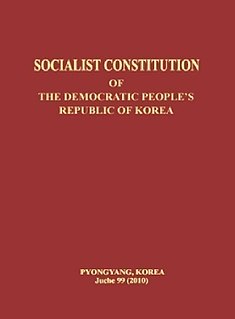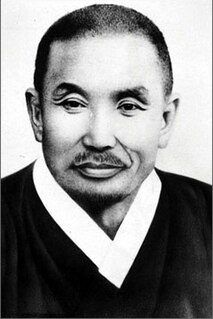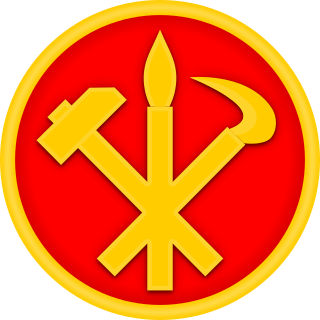
North Korea, officially the Democratic People's Republic of Korea, is a country in East Asia constituting the northern part of the Korean Peninsula. The country is bordered to the north by China and by Russia along the Amnok and Tumen rivers, and to the south by South Korea, with the heavily fortified Korean Demilitarized Zone (DMZ) separating the two. North Korea, like its southern counterpart, claims to be the legitimate government of the entire peninsula and adjacent islands. Pyongyang is the country's capital and largest city.

The politics of North Korea takes place within the framework of the official state philosophy, Juche, a concept created by Hwang Jang-yop and later attributed to Kim Il-sung. The Juche theory is the belief that only through self-reliance and a strong independent state, can true socialism be achieved.

Juche is the official ideology of North Korea, described by the government as "Kim Il-sung's original, brilliant and revolutionary contribution to national and international thought". It postulates that "man is the master of his destiny", that the Korean masses are to act as the "masters of the revolution and construction" and that by becoming self-reliant and strong, a nation can achieve true socialism.

The Premier of the Cabinet is the head of the cabinet of North Korea and a key adviser to the Supreme Leader of North Korea. The office is also alternatively known as Prime Minister of North Korea. The current premier is Kim Tok-hun.
Deportation of Koreans in the Soviet Union, originally conceived in 1926, initiated in 1930, and carried through in 1937, was the first mass transfer of an entire nationality in the Soviet Union. Almost the entire Soviet population of ethnic Koreans were forcefully moved from the Russian Far East to unpopulated areas of the Kazakh SSR and the Uzbek SSR in October 1937. The official reason for the deportation was to stem "the penetration of Japanese espionage into the Far Eastern Krai", as Koreans were at the time subjects of the Empire of Japan, which was hostile to the Soviet Union. Estimates based on population statistics suggest that 40,000 deported Koreans died in 1937 and 1938 from starvation, exposure and difficulties adapting to their new environment.

Kim Chaek University of Technology is a university in North Korea, on the banks of the Taedong River in Pyongyang. It is named after General Kim Chaek.

The Socialist Constitution of the Democratic People's Republic of Korea is the constitution of North Korea. It was approved by the 6th Supreme People's Assembly at its first session on 27 December 1972, and has been amended and supplemented in 1998, 2009, 2012, 2013, 2016 and twice in 2019. It replaced the country's first constitution which was approved in 1948.

The Chairman of the Workers’ Party of Korea is the head of the Workers’ Party of Korea (WPK), the de facto sole legal party in North Korea. It is the first priority political position of Supreme Leader.

Cho Man-sik was a nationalist activist in Korea's independence movement. He became involved in the power struggle that enveloped North Korea in the months following the Japanese surrender after World War II. Originally Cho was supported by the Soviet Union for the eventual rule of North Korea. However, due to his opposition to trusteeship, Cho lost Soviet support and was forced from power by the Soviet-backed communists in the north. Placed under house arrest in January 1946, he later disappeared, and is generally believed to have been executed in the North Korean prison system soon after the start of the Korean War.
The Communist movement in Korea emerged as a political movement in the early 20th century. Although the movement had a minor role in pre-war politics, the division between the communist North Korea and the anti-communist South Korea came to dominate Korean political life in the post-World War II era. North Korea, officially the Democratic People's Republic of Korea, continues to be a Juchesocialist state under the rule of the Workers' Party of Korea. In South Korea, communism remains illegal, through the National Security Law. Due to end of economic aid from Soviet Union after its dissolution in 1991 and impractical ideological application of Stalinist policies in North Korea over years of economic slowdown in the 1980s and receding during the 1990s, North Korea replaced Communism with the Juche ideology in its 1992 and 1998 constitutional revisions for the personality cult of Kim's family dictatorship and opening of North Korean market economy reform, though it still retains a command economy with complete state control of industry and agriculture. North Korea maintains collectivized farms and state-funded education and healthcare.

The Workers' Party of Korea is the founding and ruling political party of North Korea. It is the largest party represented in the Supreme People's Assembly and coexists de jure with two other legal parties making up the Democratic Front for the Reunification of the Fatherland. However, these minor parties are completely subservient to the WPK, and must accept the WPK's "leading role" as a condition of their existence.

Kim Il-sung or Kim Il Sung was the founder of North Korea, which he ruled from the country's establishment in 1948 until his death in 1994. He held the posts of Premier from 1948 to 1972 and President from 1972 to 1994. He was also the leader of the Workers' Party of Korea (WPK) from 1949 to 1994. Coming to power after the end of Japanese rule in 1945, he authorized the invasion of South Korea in 1950, triggering an intervention in defense of South Korea by the United Nations led by the United States. Following the military stalemate in the Korean War, a ceasefire was signed on 27 July 1953. He was the third longest-serving non-royal head of state/government in the 20th century, in office for more than 45 years.

The Central Committee of the Workers' Party of Korea is the highest party body between WPK national meetings. According to WPK rules, the Central Committee is elected by the party congress and the party conference can be conferred the right to renew its membership composition. In practice, the Central Committee has the ability to dismiss and appoint new members without consulting with the wider party at its own plenary sessions.

The Politburo, officially the Political Bureau of the Central Committee of the Workers' Party of Korea (WPK), formerly the Political Council, is the highest decision-making body in the party between sessions of the Central Committee. Article 25 of the Party Charter stipulates that "The Political Bureau of the Party Central Committee and its Standing Committee organize and direct all party work on behalf of the party Central Committee between plenary meetings. The Political Bureau of the Party Central Committee shall meet at least once every month." The Politburo is elected by the Central Committee of the Workers' Party of Korea.

The Executive Policy Bureau of the Workers' Party of Korea, until the 7th Congress known as the Secretariat, manages the work of the Politburo of the Workers' Party of Korea and its Presidium, headed by the Chairman and made up of the party vice-chairmen.

The 6th Congress of the Workers' Party of Korea (WPK) was held in the February 8 House of Culture in Pyongyang, North Korea, from 10–14 October 1980. The congress is the highest organ of the party, and is stipulated to be held every four years. 3,062 delegates represented the party's membership; 117 foreign delegates attended the congress, without the right to speak. The congress saw the reappointment of Kim Il-sung as WPK General Secretary and the Presidium of the Politburo established as the highest organ of the party between congresses.

North Korea–Seychelles relations refers to the current and historical relationship between North Korea and Seychelles. Neither country maintains an embassy in their respective capitals.

The Socialist Women's Union of Korea is a mass organization for women in North Korea. Founded in 1945 as the North Korea Democratic Women's League, it is the oldest and one of the most important mass organizations in the country. The Union has committees on every level of administrative divisions of North Korea, from ri (village) all the way up to provinces.

The Academy of Sciences of the Democratic People's Republic of Korea or State Academy of Sciences, formerly the National Academy of Sciences, is the national academy of sciences of North Korea. It was founded in 1952, and until 1981 was responsible for all research conducted in the country before various organizational reforms and splittings of academies were conducted.

The Provisional People's Committee of North Korea was the provisional government of North Korea.
















